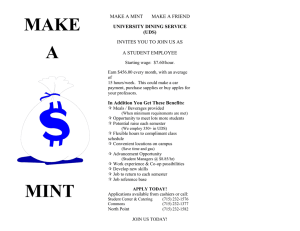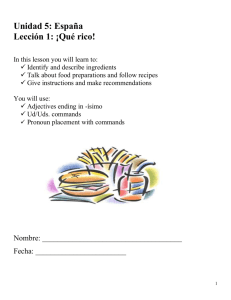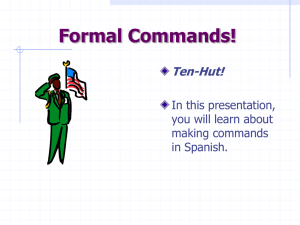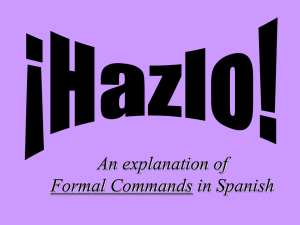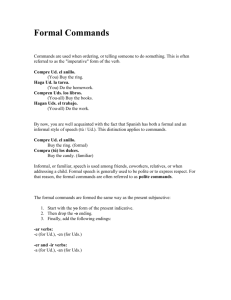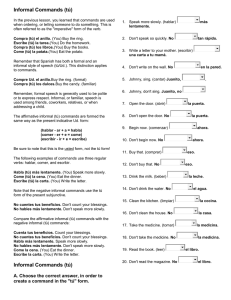Informal Commands (tú) Informal (tú) Commands (Imperative)
advertisement
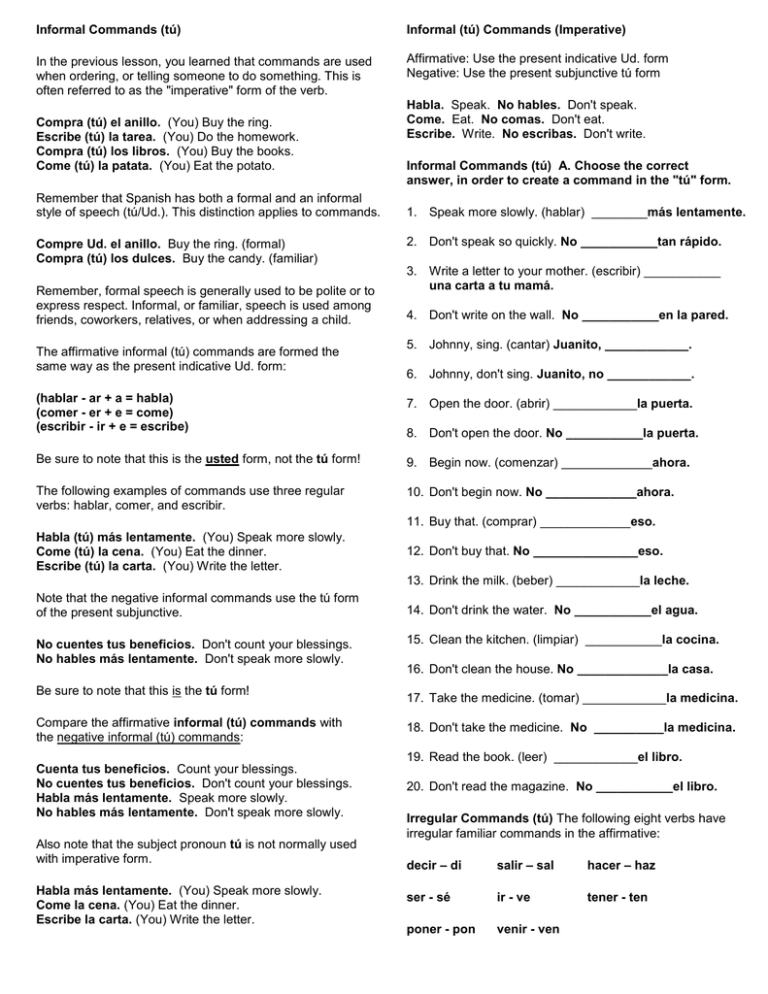
Informal Commands (tú) Informal (tú) Commands (Imperative) In the previous lesson, you learned that commands are used when ordering, or telling someone to do something. This is often referred to as the "imperative" form of the verb. Affirmative: Use the present indicative Ud. form Negative: Use the present subjunctive tú form Compra (tú) el anillo. (You) Buy the ring. Escribe (tú) la tarea. (You) Do the homework. Compra (tú) los libros. (You) Buy the books. Come (tú) la patata. (You) Eat the potato. Remember that Spanish has both a formal and an informal style of speech (tú/Ud.). This distinction applies to commands. Compre Ud. el anillo. Buy the ring. (formal) Compra (tú) los dulces. Buy the candy. (familiar) Remember, formal speech is generally used to be polite or to express respect. Informal, or familiar, speech is used among friends, coworkers, relatives, or when addressing a child. The affirmative informal (tú) commands are formed the same way as the present indicative Ud. form: Habla. Speak. No hables. Don't speak. Come. Eat. No comas. Don't eat. Escribe. Write. No escribas. Don't write. Informal Commands (tú) A. Choose the correct answer, in order to create a command in the "tú" form. 1. Speak more slowly. (hablar) ________más lentamente. 2. Don't speak so quickly. No ___________tan rápido. 3. Write a letter to your mother. (escribir) ___________ una carta a tu mamá. 4. Don't write on the wall. No ___________en la pared. 5. Johnny, sing. (cantar) Juanito, ____________. 6. Johnny, don't sing. Juanito, no ____________. (hablar - ar + a = habla) (comer - er + e = come) (escribir - ir + e = escribe) 7. Open the door. (abrir) ____________la puerta. Be sure to note that this is the usted form, not the tú form! 9. Begin now. (comenzar) _____________ahora. The following examples of commands use three regular verbs: hablar, comer, and escribir. 10. Don't begin now. No _____________ahora. 8. Don't open the door. No ___________la puerta. 11. Buy that. (comprar) _____________eso. Habla (tú) más lentamente. (You) Speak more slowly. Come (tú) la cena. (You) Eat the dinner. Escribe (tú) la carta. (You) Write the letter. 12. Don't buy that. No _______________eso. 13. Drink the milk. (beber) ____________la leche. Note that the negative informal commands use the tú form of the present subjunctive. No cuentes tus beneficios. Don't count your blessings. No hables más lentamente. Don't speak more slowly. Be sure to note that this is the tú form! Compare the affirmative informal (tú) commands with the negative informal (tú) commands: 14. Don't drink the water. No ___________el agua. 15. Clean the kitchen. (limpiar) ___________la cocina. 16. Don't clean the house. No _____________la casa. 17. Take the medicine. (tomar) ____________la medicina. 18. Don't take the medicine. No __________la medicina. 19. Read the book. (leer) ____________el libro. Cuenta tus beneficios. Count your blessings. No cuentes tus beneficios. Don't count your blessings. Habla más lentamente. Speak more slowly. No hables más lentamente. Don't speak more slowly. Also note that the subject pronoun tú is not normally used with imperative form. Habla más lentamente. (You) Speak more slowly. Come la cena. (You) Eat the dinner. Escribe la carta. (You) Write the letter. 20. Don't read the magazine. No ___________el libro. Irregular Commands (tú) The following eight verbs have irregular familiar commands in the affirmative: decir – di salir – sal hacer – haz ser - sé ir - ve tener - ten poner - pon venir - ven Note that these irregularities only occur with affirmative tú commands. Di la verdad. (tú) No digas mentiras. (tú) Haz tu tarea. (tú) No hagas eso. (tú) By now, you are well acquainted with the fact that Spanish has both a formal and an informal style of speech (tú / Ud.). This distinction applies to commands. Compre Ud. el anillo. Buy the ring. (formal) Compra (tú) los dulces. Buy the candy. (familiar) Irregular Commands (tú) A. Choose the correct answer, in order to create a command in the "tú" form. 1. Put the pen here. ____________la pluma acá. 2. Don't put the pen there. No _______la pluma allá. Informal, or familiar, speech is used among friends, coworkers, relatives, or when addressing a child. Formal speech is generally used to be polite or to express respect. For that reason, the formal commands are often referred to as polite commands. The formal commands are formed the same way as the present subjunctive: 3. Tell the truth. _________la verdad. 1. Start with the yo form of the present indicative. 4. Don't tell lies. No _________mentiras. 2. Then drop the -o ending. 5. Come here. _________acá. 3. Finally, add the following endings: 6. Don't come here. No __________aquí. 7. Be kind. _______ amable. 8. Don't be kind. No ________amable. -ar verbs: -e (for Ud.), -en (for Uds.) -er and -ir verbs: -a (for Ud.), -an (for Uds.) The following examples of formal commands use three regular verbs: hablar, comer, and escribir. 9. Set the table. ________la mesa. 10. Don't set the table. No ________la mesa. 11. Do what I tell you. ________lo que te digo. Hable Ud. más lentamente. Hablen Uds. más lentamente. Speak more slowly. Coma Ud. la cena. Coman Uds. la cena. Eat the dinner. 12. Don't do what I tell you. No _______lo que te digo. 13. Say something. _________algo. 14. Don't say anything. No ________nada. Escriba Ud. la carta. Escriban Uds. la carta. Write the letter. 15. Leave now. _______ahora. Remember, if the first person singular (yo) form is irregular, that irregularity is carried over into the formation of the formal command. 16. Don't leave now. No ________ ahora. Tengan Uds. un buen viaje. (yo tengo) Have a good trip. 17. Make the bed. __________la cama. Traiga Ud. el dinero. (yo traigo) Bring the money. 18. Don't make the bed. No _________la cama. Venga Ud. conmigo. (yo vengo) Come with me. 19. Be careful. ________cuidado. This also applies to stem-changing verbs. 20. Go right now! _________ahora mismo. Formal Commands Cuente Ud. sus beneficios. (yo cuento) Count your blessings. Vuelvan Uds. pronto. (yo vuelvo) Return quickly. Commands are used when ordering, or telling someone to do something. This is often referred to as the "imperative" form of the verb. Compre Ud. el anillo. (You) Buy the ring. Haga Ud. la tarea. (You) Do the homework. Compren Uds. los libros. (You-all) Buy the books. Hagan Uds. el trabajo. (You-all) Do the work. Pida dinero. (yo pido) Ask for money. As with the present subjunctive, the following verbs are irregular: Dar dé Ud. den Uds. estar esté Ud. estén Uds. ir vaya Ud. vayan Uds. ser sea Ud. sean Uds. saber sepa Ud. sepan Uds. Note that affirmative and negative commands use the same verb forms. Hable Ud. Speak. No hable Ud. Don't speak. Coma Ud. Eat. No coma Ud. Don't eat. Escriba Ud. Write. No escriba Ud. Don't write. Also note that the subject pronouns Ud. and Uds. may or may not be used. Using them adds a degree of formality or politeness to the command. Hable. Speak. Hable Ud. Speak. (more respectful) Coma. Eat. Coma Ud. Eat. (more polite) Formal Commands A. Write the imperative form for the given verb and pronoun. 1. Buy the book. (comprar) ___________Ud. el libro. 2. Bring the food. (traer) ___________Uds. la comida. 3. Don't cry so much. (llorar) No ___________Ud. tanto. 4. Don't smoke here, please. (fumar) No _________Uds. aquí, por favor. 5. Read the book. (leer) ____________Ud. el libro. 6. Go with her. (ir) ____________Uds. con ella. 7. Dial the number. (marcar) __________Ud. el número. 8. Don't sleep. (dormir) No _____________Uds. 9. Stir the rice. (agitar) ____________Ud. el arroz. 10. Listen, please. (oír) ____________Ud., por favor. 11. Turn left. (doblar) ____________Ud. a la izquierda. 12. Open your books. (abrir) __________Uds. sus libros. 13. Come back tomorrow. (volver) __________Ud. mañana. 14. Don't bring the car. (traer) No ___________Uds. el coche. 15. Don't go with John. (ir) No ____________Ud. con Juan. 16. Be good. (ser) _____________Ud. bueno. 17. Don't buy that house. (comprar) No __________Uds. esa casa. 18. Don't be bad. (ser) No ___________Uds. malas. 19. Open the window. (abrir) _________Ud. la ventana. 20. Don't turn right. (doblar) No _________Uds. a la derecha.
